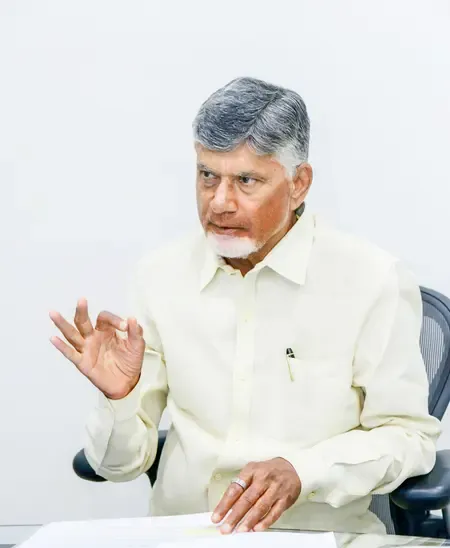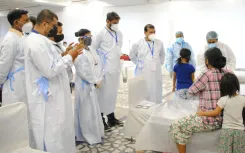Is Andhra Pradesh Set to Launch Three Circular Economy Parks?

Synopsis
Key Takeaways
- Establishment of three circular economy parks in Andhra Pradesh.
- Focus on waste management and resource reuse.
- Potential boost to GSDP by Rs. 15,000 crore annually.
- Introduction of 'Swachhta' awards for excellence in waste management.
- Ban on single-use plastics in major cities.
Amaravati, June 17 (NationPress) The government of Andhra Pradesh has announced plans to create three circular economy parks across various regions of the state within the upcoming year. This initiative aims to enhance the state's waste management system through a new circular economy policy.
During a review session at the Secretariat, Chief Minister N. Chandrababu Naidu instructed officials to finalize this policy within a two-month timeframe. The discussions centered on transforming waste into wealth and optimizing resource reuse, with a push for modern machinery in waste-to-energy plants. Immediate action was called for to clear legacy waste, and an action plan for waste segregation and recycling is expected within 90 days.
The meeting also assessed proposals from the Material Recycling Association of India for the establishment of circular economy parks. The initial phase will focus on a park spanning 400 acres in Visakhapatnam, designed to meet international standards.
To attract substantial investments, the Chief Minister suggested examining similar parks in other nations. He directed officials to devise a comprehensive strategy addressing 11 sectors identified by the Central government within the circular economy framework, including municipal waste, vehicles, lithium batteries, gypsum, tyres, rubber, electronics, agriculture, industry, and aqua waste. Additionally, he called for the inclusion of the departments of mining, handlooms, and animal husbandry, emphasizing the need for urban and rural local bodies to aim for zero waste.
In a bid to promote best practices, the Chief Minister proposed the introduction of 'Swachhta' awards starting October 2 of next year, recognizing individuals and institutions demonstrating excellence in waste management. Awards will be categorized for local bodies, self-help groups, anganwadis, schools, colleges, bus stands, hospitals, NGOs, and more.
By October 2 of this year, he mandated a complete ban on single-use plastics in four major cities: Visakhapatnam, Vijayawada, Tirupati, and Rajahmundry, along with 17 other municipal corporations. He advocated for increased usage of cloth bags in these regions. Furthermore, 157 Reduce-Reuse-Recycle centers are to be established across 87 urban locations.
Officials informed the Chief Minister about the establishment of 52 waste clusters throughout the state, with two in each district, encompassing urban and panchayat areas. Annually, Andhra Pradesh generates 36,588 tonnes of battery and automotive waste, 61,996 tonnes of plastic and PET bottle waste, 23,928 litres of engine and hydraulic oil waste, and 59,654 metric tonnes of tyre and rubber waste.
Agricultural activities contribute over 4 million metric tonnes of waste each year, while the livestock, aqua, and poultry sectors collectively produce 34.7 million metric tonnes. In rural areas, approximately 1,329 metric tonnes of waste are generated daily from 8.8 million households.
The meeting concluded with insights suggesting the effective implementation of the circular economy model in Andhra Pradesh could potentially elevate the state’s Gross State Domestic Product (GSDP) by an estimated Rs. 15,000 crore annually. Additionally, it is projected to supply materials valued at Rs 10,000 crore to the manufacturing sector, which could generate Rs. 3,000 crore annually in GST revenue.





